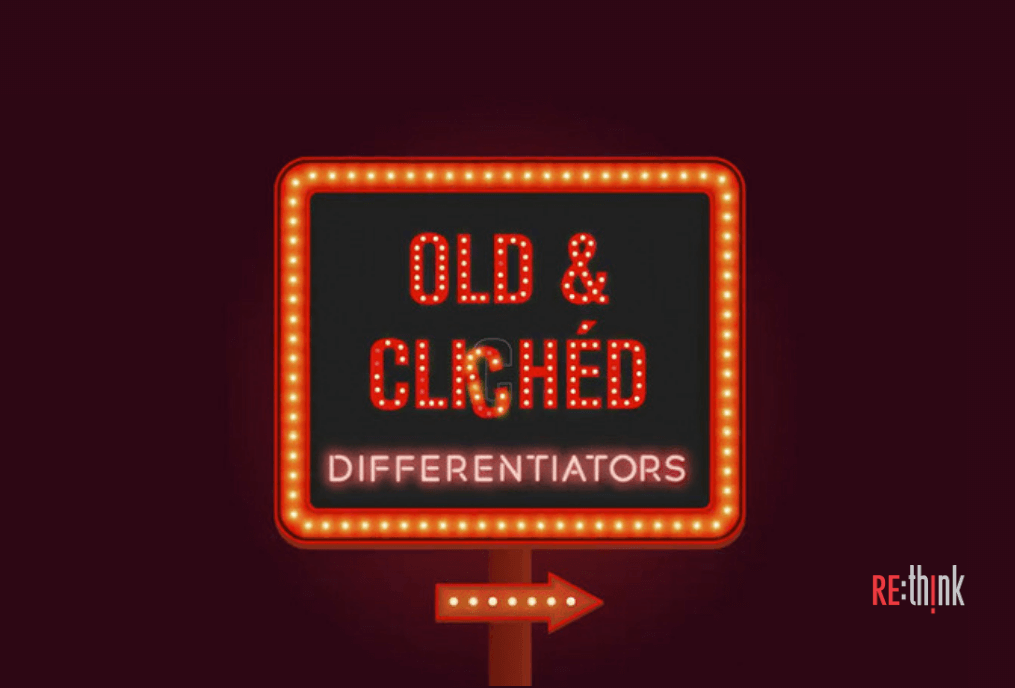Old & Cliched Differentiators
The irony of differentiation is that everyone wants to be different. Unfortunately, to truly identify your business’ differentiating factor – features of your organisational DNA that set it apart from others – is no easy task. This is why plenty of businesses share the same old claims about themselves, passing them off as differentiators. Refrain from rolling your eyes at the following ‘differentiators’:
“We aim for greatness.”
“We employ dedicated and talented staff.”
“We offer amazing client services.”
“We offer the best prices”
“We have strong client relationships, built on trust.”
“Our process is unique.”
Your brand or business might use one (or more) of these so-called differentiators. You might even be entirely convinced that your claim is true – you believe you have an excellent group of people working for you or that your customer service to clients is second to none. But having a claim that you think is true isn’t enough for it to be successful.
It’s easy to trick yourself into making redundant claims that barely sit in the minds of consumers for more than a minute. Never forget that branding is as much about the consumer as it is about your business. What does a potential customer need and how are you giving it to them? What is going to compel them to give you their business?
At the end of the day, it’s about shaping their perception of your businesses, and making it a positive and memorable one. If your business rides on claims like pricing and service quality, it will eventually drown in the noise of other businesses due to 2 reasons:
· You will always be open to your prices being undercut by someone else.
· Consumers generally expect quality service from businesses and will ignore the ‘exclusivity’ of these claims.
Brands that rely on pricing promotions might experience success in the short-term but will not find long-lasting brand loyalty, recurring purchases or organic publicity that having strategic differentiators can produce. These short-sighted claims will hinder your brand’s growth potential. To consumers, every brand promotes their customer service in one way or another. But reality often falls short of expectations as evidenced by a growing trend of empowered and highly-critical consumers. As a result, the claim carries little-to-no weight to consumers.
As you begin on your journey to carve out the differentiator of your business, make it a goal to craft one that is consequential, significant, and persuasive to the people you speak to. Of course, you will have to ensure your business is the sole owner of this differentiator in your market. The process will require a lot of research and understanding of your target audience, but the journey towards the end result will be invaluable to you in more ways than one.
Filter Your Differentiator
If you’re still unsure what a differentiator sounds or looks like, run your proposed differentiator through these 3 ‘filters’ to see if you have a legitimate differentiator on your hands:
Genuine – Did you pull your differentiator out of the air? Or is it 100% grounded in fact?
Verifiable – Walk the talk. Can you actually demonstrate your differentiating factor?
Relevant – Picture yourself as a consumer. Is this information even important to you?
If everyone offers excellent customer service, employs dedicated staff, and has a unique process, those qualities lose their value in the market and lose the ability to captivate your potential buyers in any meaningful way. Are those qualities even provable? What does it actually mean to ‘aim for greatness’ anyway?
Be aware of your competitors’ differentiators (or lack of). More importantly, look into the consumer’s thought process. Their selection process will involve looking at competitors. Make their decision an easy one by establishing a differentiator that they simply can’t ignore.
